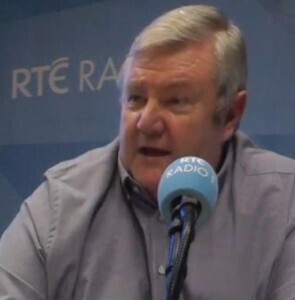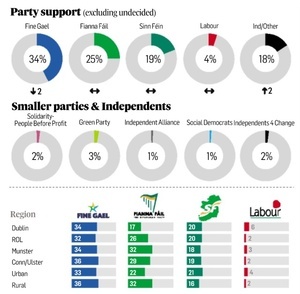Top from left: the first deputy First Minister of Northern Ireland, Seamus Mallon; former Taoiseach Bertie Ahern; Senator George Mitchell; and Gerry Adams, at an event to mark the 20th anniversary of the Good Friday Agreement, at Queen’s University, Belfast last month; Derek Mooney
In a week when a referendum campaign that has managed to divide some of us comes, mercifully, to an end; it is worth recalling that this week, in fact this day, marks the twentieth anniversary of a referendum that briefly united us across this island.
Twenty years ago today, almost 2.5 million people across this island went to the polls to vote on accepting the Good Friday Agreement. Just over 2.1 million of them said Yes to the Agreement while 360,000 voted against.
The results, North and South, endorsed what the parties had agreed at Stormont Buildings and saw Northern Ireland set to see a return of devolution based on partnership government.
Heady days. But anyone who thought that having such a sizeable public endorsement and mandate for the Good Friday Agreement was going to ensure its smooth and speedy implementation was soon to be sorely disappointed.
Even though 71.1% of Northern Irish voters who turned out to vote (the turnout was a healthy 81.1%) voted Yes and that this 71.1% still represented about 58% of all voters in Northern Ireland, the establishment of the institutions, particularly the Executive and the Assembly was painfully slow and pitiably erratic.
The Executive was more often suspended than it was sustained in the early years… just as it is now. How little has changed.
Actually, that last part is not that true. Though it is easy to be cynical and say that Northern Ireland politics is still as bitter and divided as it was prior to 1998, that is a simplistic analysis. In reality, things have changed and politics has improved.
Gone are the days when the only times that politicians from either side of the divide in the North could meet to discuss their differences was in private and out of sight of their own colleagues, lest they be accused of selling out or being a Lundy (Robert Lundy is now reviled as the Governor of Derry who sold out to the Catholic James II and betrayed the Williamites during the 1688 siege of the city).
The DUP who were opponents of the Good Friday and opposed it from without – one might say besieged it – are now on the inside and although the DUP are not now in the Executive, they have provided three DUP First Ministers to serve alongside a Sinn Féin Deputy First Minister, the late Martin McGuinness.
Where once the declined to be seen together, DUP and Sinn Féin MPs and MLAs now appear regularly in TV and Radio studios to engage directly and debate, if debate is, at times, the right word.
Yes, there are many issues still to be resolved such as parity of esteem and respect for cultural identity and difference, but progress has been real, though persistently faltering.
But, falteringly is how politics works in divided communities. It takes years for trust to build and for politicians to foster the personal relationships, across the political divides, needed to make the institutions work.
Many important issues that seemed difficult two decades ago and completely intractable and beyond resolution only a decade before that, have been tackled. These include decommissioning, reform of policing and changes to the criminal justice system.
Perhaps they were a form of political low hanging fruit. The more ripened and mature issues that were so clearly and obviously difficult that both sides had been preparing themselves to deal with them.
While the outstanding issues that prevent a return of the Executive and Assembly remains may seem trivial alongside something like decommissioning, they are still totemic and run to the heart of the Good Friday Agreement. What is missing in the political impetus – an impetus that must again come jointly from London and Dublin.
Nationalists and Republicans feel that the lack of official recognition of the Irish Language suggests that they do not belong. Unionists fear that nationalists are attempting to hollow out their Britishness and see the Irish language as a wedge.
But aren’t these two sides of the same coin? Isn’t the resolution of one the resolution of the other?
Meanwhile the two sides, by which I mean the DUP and Sinn Féin claim a mandate for their own intransigence, based on recent Assembly and Westminster results, yet ignore the fact that these mandates came from falsely accusing the other side of being the intransigent one and demanding the mandate to face down the other.
It is what Seamus Mallon has called “…the hypocrisies which are unbelievable and the untruths which are believable.” As he said at the recent QUB anniversary of the signing of the Good Friday Agreement:
“Politics has been debased and diminished by these two political silos which have almost Balkanised the Northern Ireland that I live in… It is the future we should be looking at.”
Maybe it is comments such as this that compels Sinn Féin to oppose Mallon being granted the Freedom of Drogheda?
Throughout his political career Mallon has been forthright in condemning the Provos and their apologists. But he has also been just as vehement in opposing all violence, from whatever its source. Just as he continues to be as fierce in standing with all victims and demanding that those responsible for creating the victims be held to account.
Mallon’s current work with TARP – The Truth and Reconciliation Platform – alongside Stephen Travers, Eugene Reavey, Alan McBride and others, makes him a suitable candidate for the Freedom of Drogheda, let alone his achievements as an SDLP MLA, MP, Deputy Leader, Senator or Deputy First Minister.
The horrible reality is that Sinn Féin’s opposition the Mallon being granted the honour is part of a much wider and darker attempt to rewrite recent political history and airbrush out all those whose acknowledgement expose its dark and murky past.
There will be another example of it later this year when the Provos attempt to claim that their campaign of terror against the two communities was born out of the Civil Rights movement – the very antithesis of what the Provos campaign was about.
Much has changed and improved in the twenty years since we voted together for a new start in the North. It is right to celebrate and commemorate that, once we realise that there is still a good deal of work to be done that includes addressed what TARP’s Stephen Travers has called:
“The pain that continues to cripple society in the North will eventually totally disable it if it is not addressed very soon. The real urgency, and the first priority, is not reconciliation; it is the acknowledgment, by both sides, that terrible things were done in their name.”
Derek Mooney is a communications and public affairs consultant. He previously served as a Ministerial Adviser to the Fianna Fáil-led government 2004 – 2010. His column appears here every Tuesday Follow Derek on Twitter: @dsmooney








…the gospel according to saint Derek…still knocking the shinners and shilling for bitter old green tory Mallon…still on the wrong side of history…Cromwell has better claims to the Freedom of Drogheda than Mallon…
go on, enlighten us as to how Cromwell has better claims to the freedom of Drogheda than Mallon. please, do explain
…well Glenda, possibly an unfortunate analogy given that Cromwell took the freedom of Drogheda from a bunch of catholic confederates rather than having it bestowed on him…but then I don’t want to be guilty of the type of revisionism that FFer Derek indulges in here every week…
so Mallon has a claim to the freedom of Drogheda then. thanks for that
…Seamus would prefer recognition of the stipendiary kind…his share of a Nobel or a nice gig in the Lords like Fitt the brit got…he’d reckon he’s entitled…another thing he and Derek have in common…
Take off the tin foil hat Derek and join us in 2018,why do you think its appropriate to honor just one person involved in the peace process, why single him out and give him an award instead of the many who were involved.
Its always ‘provo’s this ‘provo’s’ that,probably just a coincidence that SF is ahead FF in recent polls, constantly invoking the past reveals that FF have no plan for the future.People are tired off politicians and their advisors dragging up the past for political gain.Look to the future Derek and let sleeping dogs lie, who wants live in the past with a group boring old men and has beens?
You know I could swear I saw you post only the other day about the damage inflcted on this country by the likes of FF/FG/The Church etc.
Correct. The Fine Failures will eventually become as redundant as the Labour party.Time for a change of plan Derek.
You also b*itched about naming the dead guy,do you wee in your cornflakes every day,or are you just a miserable unhappy loser ?
As usual you’re wrong..
any coincidence that this opinion piece appears when polls are showing SF ahead of FF?